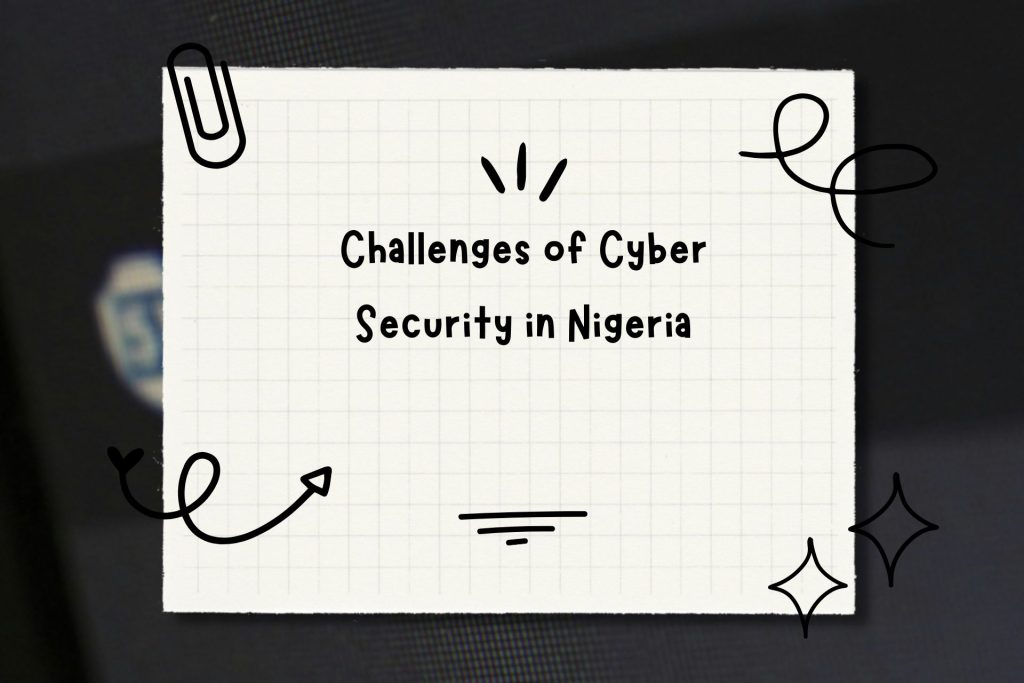The surge in cybersecurity threats has emerged as a significant concern for businesses, governments, and individuals worldwide.
Nigeria is no exception, grappling with a spectrum of cyber threats that present substantial hurdles to its cybersecurity landscape. With the rapid proliferation of digital technologies and the expansion of the internet, the perils associated with cybercrime are escalating, underscoring the urgency for Nigeria to proactively bolster its cybersecurity stance.
A pivotal obstacle confronting Nigeria’s cybersecurity pertains to the lack of awareness and education among the general public. Many individuals in Nigeria remain oblivious to the risks linked to cybercrime, rendering them more susceptible to cyber attacks.
This dearth of awareness is compounded by the inadequate cybersecurity measures in place within numerous businesses and organizations in Nigeria, leaving them susceptible to incursions by cybercriminals.
Furthermore, Nigeria encounters a significant challenge in the form of insufficient investment in cybersecurity infrastructure and technology.
Numerous businesses and organizations in the country lack the resources to invest in cutting-edge cybersecurity technologies, leaving them vulnerable to attacks. Additionally, Nigeria’s regulatory framework for cybersecurity is still nascent, rendering it arduous to enforce cybersecurity standards and regulations.
Consequently, Nigeria confronts substantial obstacles in its endeavors to shield against cyber threats and enhance its cybersecurity posture.
Overview of Cyber Security in Nigeria

Nigeria, like many other countries, is facing an increasing number of cyber threats. With the rapid growth of technology in the country, cybercriminals are finding new ways to exploit vulnerabilities in computer systems and networks.
One of the major challenges facing Nigeria’s cyber security is the lack of adequate infrastructure and resources. Many organizations do not have the necessary tools and expertise to protect their networks from cyber attacks. This has led to a rise in cybercrime, including phishing scams, identity theft, and ransomware attacks.
Another challenge is the lack of awareness among the general public about cyber security. Many people are not aware of the risks associated with using the internet and do not take necessary precautions to protect themselves. This has made them vulnerable to cyber attacks and has contributed to the rise in cybercrime in the country.
The Nigerian government has taken steps to address these challenges by implementing policies and regulations aimed at improving cyber security. For example, the National Cybersecurity Policy and Strategy was launched in 2014 to provide a framework for the country’s cyber security efforts. Additionally, the Cybercrime (Prohibition, Prevention, etc.) Act was enacted in 2015 to criminalize cybercrime and provide legal recourse for victims.
Despite these efforts, Nigeria still faces significant challenges in the area of cyber security. It is important for individuals and organizations to take proactive measures to protect themselves from cyber attacks and for the government to continue to invest in improving the country’s cyber security infrastructure and resources.
Recommended articles
Key Cyber Threats in Nigeria
Nigeria is a country that is rapidly embracing technology, but with this comes the risk of cyber threats. The country has seen a rise in cybercrime in recent years, with both individuals and organizations falling victim to various types of cyber attacks. In this section, we will discuss some of the key cyber threats in Nigeria.
1. Phishing Attacks
Phishing attacks are one of the most common types of cyber attacks in Nigeria. These attacks typically involve an attacker posing as a legitimate entity, such as a bank or an email provider, and attempting to trick the victim into providing sensitive information, such as login credentials or credit card details. Phishing attacks can be carried out through email, social media, or even text messages.
2. Malware and Ransomware
Malware and ransomware are also significant cyber threats in Nigeria. Malware is a type of software that is designed to harm a computer system or network, while ransomware is a type of malware that encrypts a victim’s files and demands payment in exchange for the decryption key. These types of attacks can be devastating for individuals and organizations, as they can result in the loss of sensitive data and financial loss.
3. Insider Threats
Insider threats are another significant cyber threat in Nigeria. These threats come from within an organization, and can be carried out by employees, contractors, or even partners. Insider threats can take many forms, including theft of intellectual property, sabotage, and data breaches. Organizations must take steps to mitigate the risk of insider threats, such as implementing access controls and monitoring employee activities.
Strategies for Enhancing Cyber Security
Nigeria faces a number of challenges when it comes to cyber security, but there are strategies that can be put in place to help mitigate these risks. In order to improve cyber security in Nigeria, a multifaceted approach is necessary. This section will outline some key strategies that can be used to enhance cyber security in Nigeria.
1. Legal and Regulatory Framework
One of the most important strategies for enhancing cyber security in Nigeria is to establish a strong legal and regulatory framework. This includes laws and regulations that govern the use of technology, as well as the protection of sensitive information. The government can work with industry leaders and other stakeholders to develop and implement these regulations. This will help to ensure that all organizations are held accountable for their cyber security practices.
2. Public Awareness and Education
Another important strategy for enhancing cyber security in Nigeria is to increase public awareness and education. This includes educating individuals and organizations about the risks of cyber attacks and how to protect themselves. The government can work with schools and other educational institutions to incorporate cyber security education into their curricula. They can also launch public awareness campaigns to raise awareness about cyber security risks and how to prevent them.
3. Collaboration and Information Sharing
Finally, collaboration and information sharing are critical strategies for enhancing cyber security in Nigeria. The government can work with private sector organizations, international partners, and other stakeholders to share information about cyber threats and vulnerabilities. This will help to improve the overall cyber security posture in Nigeria, as organizations will be better equipped to respond to threats and prevent attacks.
In conclusion, enhancing cyber security in Nigeria requires a comprehensive approach that includes legal and regulatory frameworks, public awareness and education, and collaboration and information sharing. By implementing these strategies, Nigeria can better protect itself against cyber threats and ensure the security of its citizens and organizations.
Challenges Facing Cyber Security Implementation
1. Limited Technical Infrastructure
Nigeria’s limited technical infrastructure is one of the major challenges facing the implementation of cyber security in the country. The lack of adequate technological infrastructure means that there are limited resources available to combat cyber threats. This has resulted in a high rate of cyber attacks, which have caused significant financial losses to businesses and individuals in the country.
2. Scarce Cybersecurity Expertise
Another challenge facing the implementation of cyber security in Nigeria is the scarcity of cybersecurity expertise. There is a shortage of skilled cybersecurity professionals in the country, which makes it difficult to develop and implement effective cyber security strategies. This has led to a situation where many organizations are unable to protect themselves adequately against cyber threats.
3. Economic and Political Factors
Economic and political dynamics exert a substantial influence on the obstacles encountered in implementing cybersecurity in Nigeria. The country’s economy heavily relies on oil exports, leading to a disregard for other sectors, including technology.
Consequently, there has been a lack of investment in cybersecurity infrastructure and expertise. Furthermore, political instability and corruption have hindered the enforcement of cybersecurity laws and regulations, fostering a conducive environment for cybercriminal activities.
In summary, the challenges confronting cybersecurity implementation in Nigeria are formidable and demand immediate attention. Collaborative efforts between the government and private sector are imperative to surmount these challenges, necessitating investments in technological infrastructure, the cultivation of cybersecurity expertise, and the enhancement of the legal and regulatory framework for cybersecurity.





